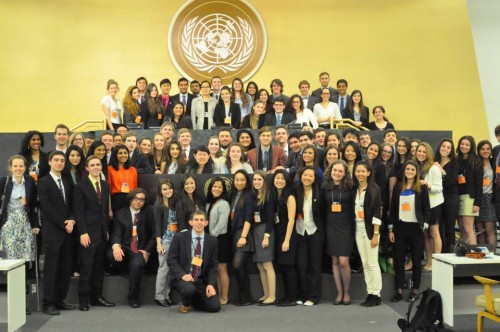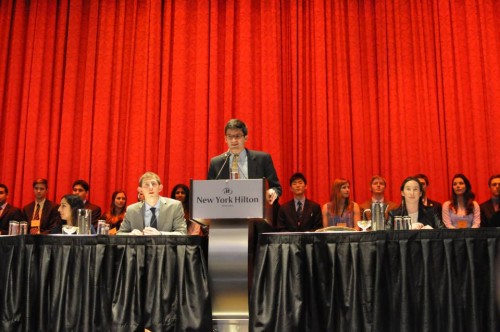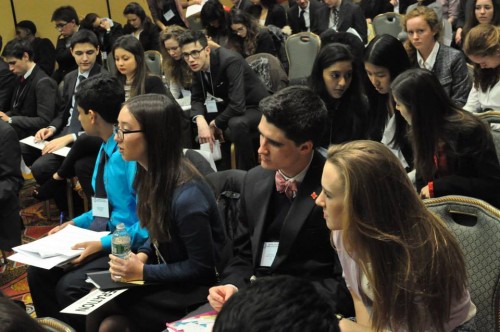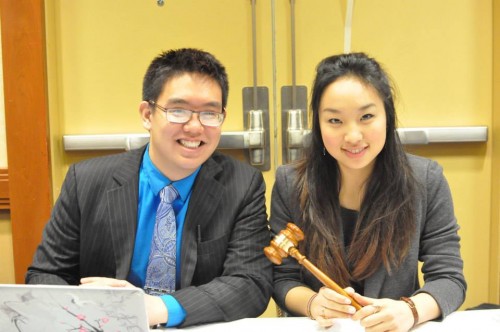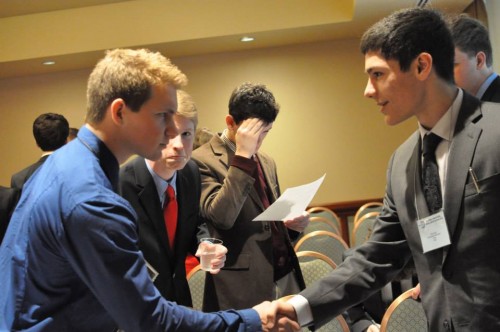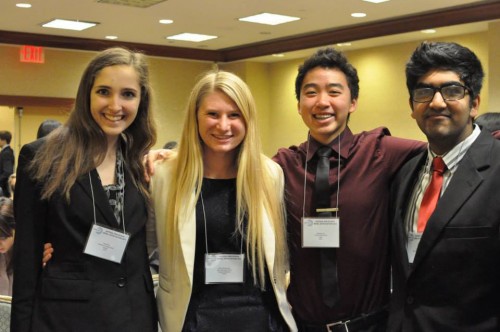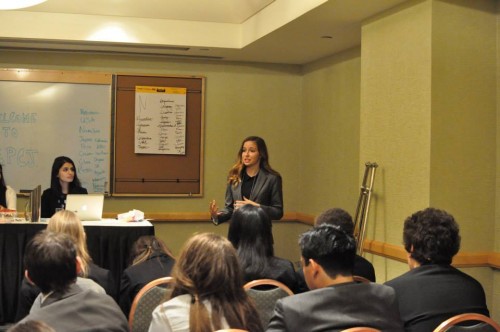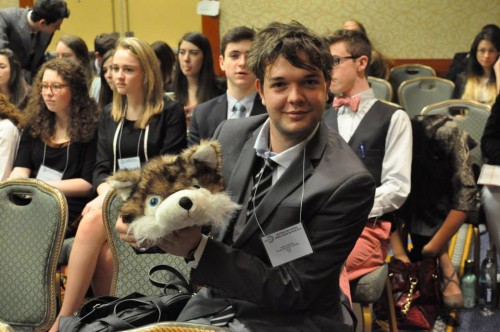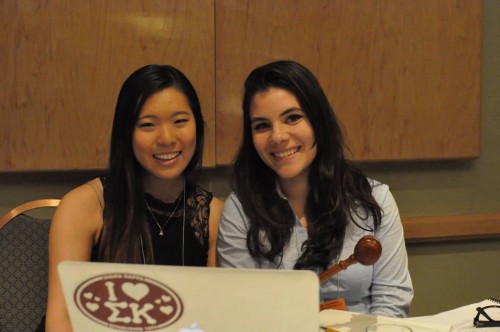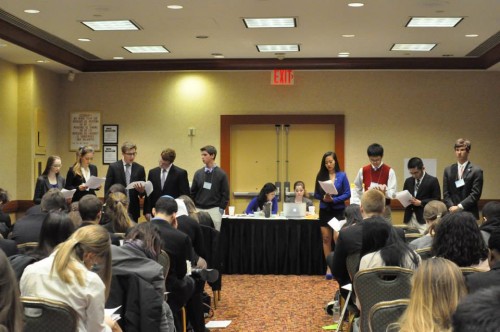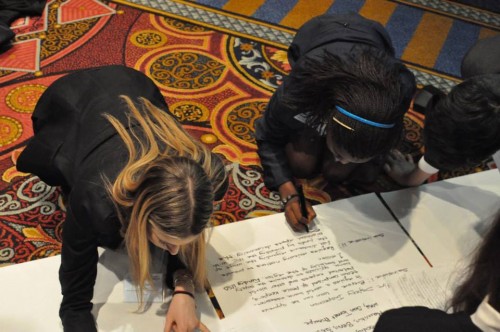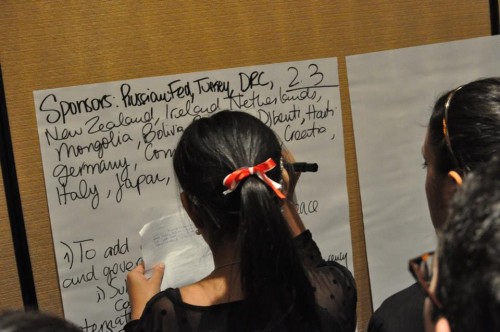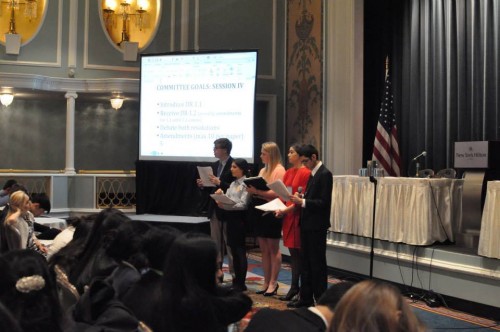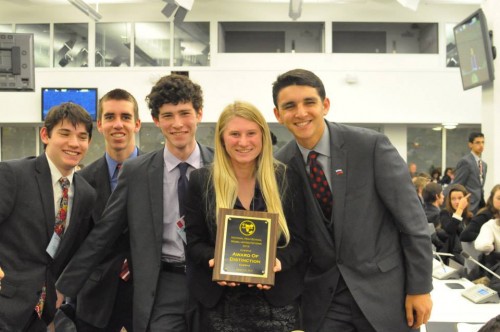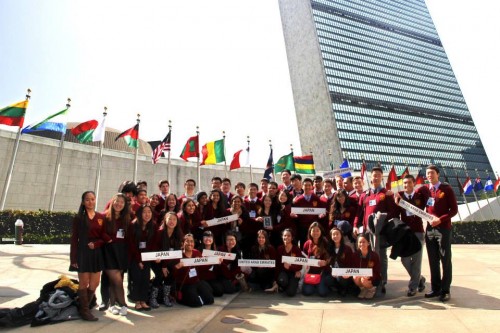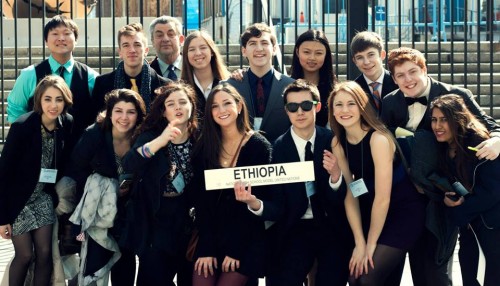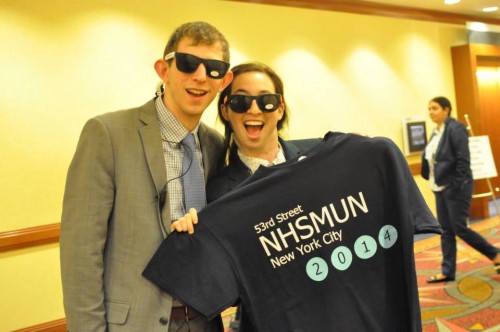Reflecting on its 40th anniversary, Secretary-General CJ Stavrakos pointed out how much the world has changed since the Cold War in 1974 and how the leaders of the world today were just teens or college students back when NHSMUN first started. He told delegates to “Believe your actions will change the world because one day it will.” This year, 91 staff members helped simulate 29 committees — that’s the most ever simulated in the history of NHSMUN.
The tagline of IMUNA is “Education Through Simulation.” Many MUN conferences say their focus is on the educational side of Model UN, but I observed ten things that NHSMUN did differently that made it truly stand out in the MUN community.
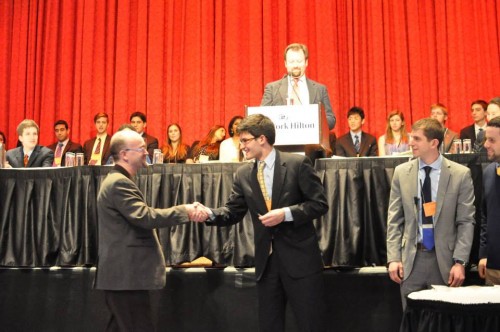
An advisor receives a pin for attending NHSMUN for 25 years. NHSMUN has a strong focus on faculty advisor development.
1. Faculty Advisors appreciation: Teachers received pins from IMUNA during Opening Ceremonies for every five years that they have attended NHSMUN. No other major conference in the world has that type of highly visible appreciation and long-lasting relationships with their faculty advisors.
2. Faculty Advisors workshop: Best Delegate has conducted workshops for faculty advisors at NHSMUN most years, and we got to do the same again this year. In fact, our workshop on How to Lead Your Model UN Program was one of the best attended faculty advisor workshops we have ever run. We shared tips on how to prepare students, grow their teams, and create a local circuit of MUN conferences, and we also discussed interesting developments in the broader MUN community such as Best Delegate’s upcoming free online teacher training courses as well as Online MUN and the UN4MUN procedure.
3. Faculty Advisors Security Council Simulation: NHSMUN put on a Security Council simulation for the faculty advisors. Many faculty advisors never had the chance to do Model UN as students, and this was one of the few opportunities to experience what their students go through.
4. Relevant keynote speaker: Michael Trainer, the founder of Global Citizen Festival, spoke about how young people can take action and share his own story about starting this festival that brought together social good with music. He entertainingly shared his biggest lessons, including dreaming big to build support, have a resonating story, innovate through technology, build trust and emotional responses, lead through giving and adding value, and being authentic and embracing potential failure. I thought this advice was so much more relevant to the high school students than the typical keynote speaker who knows nothing about MUN and speaks about a specialized, non-relevant subject — and judging by how attentive the students were throughout the 45 minute talk, I think the students enjoyed it too.
5. Students to Staff: I’m not exactly sure what the internal staff hashtag of #bluemoon refers to, but I definitely know that NHSMUN is one of the few conferences in the world where the vast majority of the staff were once students who attended the conference (I believe they mentioned somewhere from 80-90% of staff). In fact, there was a hard pitch to have high school seniors apply for next year’s staff. This students to staff pipeline ensures a consistent culture, shared experiences, and high quality chairing.
6. UN Committees: Most large conferences with this many committees have started to field a mixed lineup of traditional UN committees and crisis committees. NHSMUN maintains its educational stance and proves that even at 29 committees and with a few midnight crises, the simulations can still be based on focusing on research-based, traditional UN committees.
7. Well-written background guides: Many advisors, including an advisor of a top-ranked team, commended the quality of the background guides. The chairs clearly know their topics — and in fact the chairs spend the summer intensively researching and writing the background guides. This ensures that the debate quality is higher and that the resolutions are more realistic.
8. Solution charts: In multiple committees, I saw chairs write solution charts or mind-maps on the whiteboard or the large post-it papers that frame the different aspects that need to be addressed in the topic. These charts present an outline for what a comprehensive resolution should include and encourages delegates to think about multiple issues that they may not have thought about.
9. Embassy visits: NHSMUN takes advantage of its location in New York City to organize visits to the embassies of the country that each school is representing. Most of the visits are highly educational and allow the delegates to truly understand their country’s perspective rather than extrapolating it from research or making it up.
10. UN Headquarters: Visiting the UN Headquarters is always a unique experience, even if it was the temporary General Assembly Hall this year since the regular GA Hall is under renovation. Visits to the UN tend to be inspiring and remind students that the simulations they are experiencing are not just games but rather reflect real work of diplomats.
Bonus #11: Commitment to Education. I had a chance to meet the new Secretaries-General of RHSMUN and SUSMUN during NHSMUN. We spoke about how to sustainably expand those conferences so that more delegates can experience the high quality of MUN that is simulated at NHSMUN as opposed to the strategy other conferences are taking by trying to promote the competitiveness level of their conferences for rankings purposes.
Liveblog
Here are some photos from the conference. Two items to note compared to normal conference liveblogs: 1) Delegates are a lot more friendly with each other and take photos together, and 2) the IMUNA conferences have a strict no-electronic device policy so you’ll see delegates writing amendments on big post-it notes that are then posted around the committee room.
The NHSMUN Photo Album can be found here!
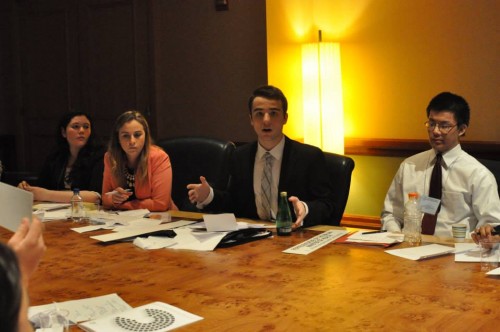
Crisis committees at NHSMUN are still based on the United Nations. MINUSMA, the mission in Mali, was simulated here.
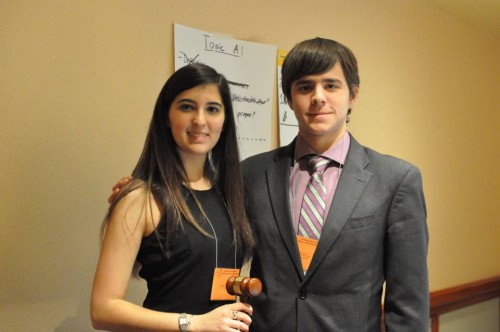
The ICJ dais was great. The Chair took time to explain ICJ proceedings and even had examples of previous cases and decisions for delegates to reference.
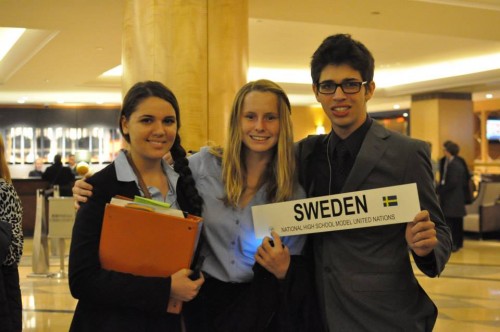
American Heritage School representing Sweden. Two of these delegates were Best Delegate Summer Programs alumni!
Recognition
NHSMUN does not give out individual delegate awards except in a few specialized committees, and that maintains the educational focus of the conference when many major conferences are emphasizing awards and competition. However, NHSMUN does give out several tiers of delegation awards as well as delegation research awards. Closing Ceremonies was split into two sessions this year, but fortunately we have the full list below.
Award of Distinction
- Glenbrook South High School (Illinois)
- Mira Costa High School (California)
- Radnor High School (Pennsylvania)
- Richland Northeast High School (South Carolina)
Award of Excellence
- Centennial High School (Georgia)
- Chicagoland Jewish High School (Illinois)
- Franklin High School (New Jersey)
- Hillfield Strathallan College (Ontario, Canada)
Award of Merit
- Bay Shore High School (New York)
- Cerritos High School (California)
- Instituto Andes (Venezuela)
- Liberal Arts and Science Academy (Texas)
- Woodstock Academy (Connecticut)
Outstanding Achievement by a Foreign Delegation
- Anatolia College (Greece)
- Colegio Cumbres Medellin (Colombia)
- Laurentius-Gymnasium (Germany)
- Prepa Ibero (Mexico)
Research Awards
- Distinction: Richland Northeast High School (South Carolina)
- Excellence: Centennial High School (Georgia)
- Merit: Glenbrook South High School (Illinois)
**
Congratulations to all the delegates, faculty advisors, and staff of NHSMUN 2014! Don’t forget to check out all the photos here!
And thank you to the IMUNA Board, CJ Stavrankos, Ryan Youra, Lizzie Kubo-Kirschenbaum, Zeena Bhakta, and the rest of the NHSMUN staff for your hospitality!

